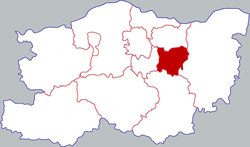Guancheng District (Chinese: 管城区; pinyin: Guǎnchéng Qū), or Guancheng Hui District (Chinese: 管城回族区; pinyin: Guǎnchéng Huízú Qū; Xiao'erjing: قُوًاچْع خُوِذُو ٿُو), is one of 6 urban districts of the prefecture-level city of Zhengzhou, the capital of Henan Province, China.
Guancheng
管城回族区 · قُوًاچْع خُوِذُو ٿُو | |
|---|---|
| Guancheng Hui District | |
 Zijingshan Road | |
 Location in Zhengzhou | |
 Zhengzhou in Henan | |
| Coordinates (Guancheng government): 34°45′16″N 113°40′39″E / 34.7544°N 113.6774°E | |
| Country | People's Republic of China |
| Province | Henan |
| Prefecture-level city | Zhengzhou |
| Area | |
• Total | 204 km2 (79 sq mi) |
| Population (2019)[1] | |
• Total | 835,700 |
| • Density | 4,100/km2 (11,000/sq mi) |
| Time zone | UTC+8 (China Standard) |
| Postal code | 450000 |
| Website | www |
History
editThe ancient Shang Dynasty city of Ao existed within the location of the present-day Guancheng Hui District.[2][3] Dating back to sometime between 1600 BCE and 1100 BCE, the location of Ao's ruins now lie within Shang City Park.[2]
The city of Zhengzhou was captured by the People's Liberation Army in 1948.[4]
In 1958, Guancheng Hui District was established after the merger of Longhai District (Chinese: 陇海区) and Jinshui Hui District (Chinese: 金水回族区).[4]
In May 1966, Guancheng Hui District was re-designated as Xiangyang District (Chinese: 向阳区).[4] Along with the district's name change, various subdistricts within it were renamed.[4]
In November 1981, it was re-designated as Xiangyang Hui District (Chinese: 向阳回族区).[4]
In 1983, the district returned to its original name, Guancheng Hui District, which it remains named as today.[4] Various subdistricts within the district which were renamed during the Cultural Revolution reverted to their original names.[4]
Geography
editGuancheng Hui District has an elevation ranging from about 100 metres (330 ft) to 140 metres (460 ft) above sea level.[5]
A number of rivers flow through the district, including the Xiong'er River, the Qili River, the Chao River, and the Shibali River, which are all tributaries of the larger Huai River.[5]
Administrative divisions
editThe Guancheng Hui District administers 13 subdistricts, and 1 township.[6] The district government is located within the Beixia Street Subdistrict.[5]
Subdistricts
editThe following 13 subdistricts are located within the district:[6]
Township
editThe district's sole township is Putian Township.[6]
Demographics
editThe district has a sizable Hui population, which totals about 23,000 people.[3]
Cultural Sites
editThe district is home to a number of cultural sites, many of which date back hundreds of years. The famous Zhengzhou Shang City ruins, which possibly date back to sometime between 1600 BCE and 1100 BCE, lie within the district.[2] The Beidajie Mosque, which possibly dates back to the Ming Dynasty, and continues to serve as a cultural center for the city's Muslim population, is located within the Beixia Street Subdistrict.[3][7] The mosque is both the oldest and largest in Zhengzhou.[3] The Zhengzhou Chenghuang Temple, which dates back to the Ming Dynasty, also lies within the district.[3]
A number of historically significant streets, such as Guancheng Street, East Avenue, and Shuyuan Street, lie within the district.[3]
The Zhongyuan Tower, a 388 meter tall steel skyscraper, is also located within the district.[8]
Economy
editThis section needs expansion. You can help by adding to it. (May 2017) |
Yutong has its headquarters in the Yutong Industrial Park (Chinese: 宇通工业园) in the district.[9]
Guancheng Hui District is home to a sizable gold and jewelry industry, which accounts for transactions worth ¥20 billion annually.[3] This comprises over 60% of the total industry in Zhengzhou.[3]
Transportation
editNational Highway 107 and National Highway 310 both pass through Guancheng Hui District.[5]
The Longhai Railway and the Beijing–Guangzhou railway both pass through the district.[5] The Zhengzhou East railway station is located in the district.[5]
References
edit- ^ a b 最新人口信息 www.hongheiku.com (in Chinese). hongheiku. Retrieved 2021-01-12.
- ^ a b c Shang City Ruins, China Tours, visited on April 12, 2008.
- ^ a b c d e f g h 管城概况 [Guancheng Overview] (in Chinese). Zhengzhou Guancheng Hui District People's Government. Archived from the original on 2020-12-27. Retrieved 2020-12-26.
- ^ a b c d e f g 管城回族区历史沿革. XZQH.org (in Chinese). 2013-05-28. Archived from the original on 2020-12-27. Retrieved 2020-12-26.
- ^ a b c d e f 管城回族区概况地图 (in Chinese (China)). XZQH.org. 2013-05-28. Archived from the original on 2020-12-27. Retrieved 2020-12-26.
- ^ a b c 2020年统计用区划代码(管城回族区) (in Chinese). National Bureau of Statistics of China. 2020. Archived from the original on 2020-12-19. Retrieved 2020-12-19.
- ^ 郑州北大街清真寺系列之一一个穆斯林乡佬的清洁世界. news.sina.com.cn (in Chinese (China)). Retrieved 2020-04-18.
- ^ 管城回族区中原福塔攻略-中原福塔门票价格多少钱-团购票价预定优惠-景点地址图片-【携程攻略】. gs.ctrip.com (in Chinese (China)). Retrieved 2020-04-18.
- ^ "Our Location." Yutong. Retrieved on May 21, 2017. "Address: Yutong Industrial Park, Yutong Road, Zhengzhou, Henan Province, China P.C.: 450061" Chinese address Archived 2023-06-21 at the Wayback Machine: "中国·河南省郑州市管城区宇通路宇通工业园 邮编:450061"